Fujinami cruises in test run at 57kg, earns ticket to World U23
Tuesday, April 15, 2025 - 07:47 By Ken Marantz

TOKYO (April 14) -- Paris Olympic champion Akari FUJINAMI took her new, slightly bulked-up body out for its first spin on Sunday, and it was just as high-performance as ever.
Fujinami, the reigning world and Olympic champion at women's 53kg, made her first official foray into the next Olympic weight class of 57kg, and cruised to victory in the U23 division at the Japan Junior Queens Cup in Tokyo.
"It was my first tournament at 57kg and, as the starting point at [this weight], I feel this was a good tournament to get an idea of my power at 57kg and the method for making the adjustment, all while maintaining the right amount of tension," Fujinami said.
The tournament also saw the return to the mat of Paris 62kg champion Sakura MOTOKI, who also prevailed in the U23 tournament, while recently crowned senior Asian champion Sakura ONISHI earned a chance to repeat as world U20 champion, and one-time heavyweight prodigy Ayano MORO returned in triumph at U20 from a 16-month injury absence.
Fujinami needed just two wins to win her title, winning both matches by 10-0 decision in the first period. That extended her current winning streak to 141 straight victories dating back to a loss in the final at the national junior high school championships in June 2017.
The victory also earned the 21-year-old star a place on Japan's team to the World U23 Championships, to be held Oct. 20-26 in Novi Sad, Serbia, which gives her a shot at one of the few major titles she hasn't already won.
The Junior Queens Cup, held over two days at the Tokyo Budokan in eastern Tokyo, featured competition in the four age-group divisions, U15, U17, U20 and U23, and was serving as the world qualifiers in the latter three and the Asian Championships for all four.
It was Fujinami's first individual competition since winning the 53kg gold medal at the Paris Olympics in August last year, when she added to her senior world titles from 2021 and 2023. She capped the day by finishing off Kanon YAMASHITA 10-0 in the final just inside the first-period buzzer.
"Of course, winning the title here was among my objectives," said Fujinami, who has started her third year at Nippon Sports Science University. "But I wanted to use the time here to get an actual feel for the 57kg weight class.
"In practice, I often train with others in heavier weight classes, but there is a difference between practice and actual matches. And I wanted to get that match feeling. For sure, I could feel the four-kilogram difference, but it didn't seem that big."
 Akari FUJINAMI (JPN) makes her debut at 57kg at the Japan Junior Queens Cup. (Photo: Ikuo Higuchi / wrestling-spirits.jp)
Akari FUJINAMI (JPN) makes her debut at 57kg at the Japan Junior Queens Cup. (Photo: Ikuo Higuchi / wrestling-spirits.jp)
Her only previous action since Paris was at a collegiate team tournament. Because it had just three weight classes, many participants, including Fujinami, wrestled outside of their usual division. She won both of her matches by fall.
More significantly, it was at that event that Fujinami made the eye-opening announcement that she was moving up to 57kg, citing the difficulty of cutting weight, as well as the historic aspect that no woman wrestler has ever won a second straight Olympic gold after moving to a higher weight class.
Fujinami, who said she never considered making a detour at 55kg, has been spending time looking for the right balance of adding weight while not losing the speed and agility that have become her trademark.
"I won't be making big changes to my style of wrestling and what has worked for me, but I will adopt and add things that fit my style so I can make progress and get to point where I'm stronger at 57kg,"she said.
The Junior Queens Cup provided the first test run in preparation for a much bigger challenge coming up. Fujinami is certain to face a significantly higher level of competition at the Meiji Cup All-Japan Invitational Championships in June, which will serve as the second of two domestic qualifiers for this year senior World Championships.
"The Meiji Cup in June will be the big test, and I realized here the aspects in which I want to get stronger," Fujinami said.
The world champion also said she is working on expanding her repertoire of techniques. "I want to expand my wrestling. I want to raise the level of my attacks so I can score points in different ways.
"There were things that worked and things that didn't work in these two matches. One thing I tried to work on was using an underhook, but it didn't go very well. I'll look at the video and make adjustments. I want to have more ways to score points beyond my specialty tackle."
 Akari FUJINAMI (JPN), third from left, with other 57kg medalists. (Photo: Ikuo Higuchi / wrestling-spirits.jp)
Akari FUJINAMI (JPN), third from left, with other 57kg medalists. (Photo: Ikuo Higuchi / wrestling-spirits.jp)
One thing Fujinami doesn't want to do is dwell on the past -- she particularly doesn't like to talk about the winning streak. Her focus is forward, and constantly striving to improve.
"The Paris Olympics are done and in the past and I have begun my next challenge," she said. "Of course, there is the next Olympics. But before that, my thinking is to keep making progress and exceed my past self."
The elephant in the room regarding her move up to 57kg is that it puts her on a collision course with Tsugumi SAKURAI, the Paris gold medalist in that weight class. Fujinami has already beaten Sakurai, but not for such stakes as will be involved in the run-up to the 2028 Los Angeles Olympics.
Asked if there were any wrestlers at 57kg that she looked forward to facing, she replied, "Actually, there are not really any particular wrestlers that I think like that. It's more about me finding out what kind of wrestling I can do at 57kg. I have my own expectations, and I want to exceed who I was at 53kg."
One aspect of her move to 57kg that appeals to Fujinami is that she no longer has to spend time obsessing over her weight, time that can be put to much better use.
"When I was at 53kg, I would have to start focusing on cutting weight from one month before [a tournament] and that would dictate my lifestyle," she said. "But at 57kg, I can continue my regular life, which allows me to focus on the wrestling aspect."
 Sakura MOTOKI (JPN), left, won the 62kg gold at the Junior Queens Cup to qualify for the World U23 Championships. (Photo: Ikuo Higuchi / wrestling-spirits.jp)
Sakura MOTOKI (JPN), left, won the 62kg gold at the Junior Queens Cup to qualify for the World U23 Championships. (Photo: Ikuo Higuchi / wrestling-spirits.jp)
Motoki stays on track to 'Golden Grand Slam'
For Motoki, the hiatus she took after the Olympics allowed her to enjoy some culinary excesses that she normally has to avoid. She was able to get back into decent enough shape, although for better or worse, it did not play much of a factor as her weight class only had two entrants.
"I had a half-year blank since my last match at the Olympics," said Motoki, who defeated Nagisa ITO by fall in 1:02. "After getting back into shape, I thought this was good timing for getting my body back into live-match mode. I was a bit nervous.
"Partly due to cutting weight, I felt my movement was dull in the morning, but I had a long time until my match, so I was able to recover. When I was warming up, I thought, 'I feel good.' Physically, I was in pretty good condition."
Motoki also plans to enter the Meiji Cup, where she could renew her rivalry with Paris 68kg bronze medalist Nonoka OZAKI, whom she beat out for the Olympic 62kg spot. But, she said, her focus is actually more on the U23 worlds.
"This year is the last I can compete in U23," she said. "You can wrestle at the senior worlds at any age, so I'm in no rush for that. I think it's best to do it when I'm ready, both physically and technically."
A victory at the world U23 would keep Motoki on track to a feat accomplished by just two other wrestlers in history. Only compatriot Yui SUSAKI and Amit ELOR (USA) have achieved the "Golden Grand Slam" of titles on all four age-group levels along with an Olympic gold.
Motoki already has world U17 (2018) and U20 (2022) titles, and arguably got the hardest one out of the way by winning the gold in Paris. She came up short twice previously at the senior worlds, taking a bronze in 2022 and silver in 2023.
Among the other U23 winners on Sunday were senior world 55kg champion Moe KIYOOKA, who returned to that weight class after taking a silver medal at 53kg at the Asian Championships in March, and Ami ISHII at 68kg. Ishii, the world 72kg champion, has recovered from the injury that caused her to become a late withdrawal in Amman.
 Sakura ONISHI (JPN) wrestles at the U20 tournament of the Junior Queens Cup. (Photo: Ikuo Higuchi / wrestling-spirits.jp)
Sakura ONISHI (JPN) wrestles at the U20 tournament of the Junior Queens Cup. (Photo: Ikuo Higuchi / wrestling-spirits.jp)
Onishi adds to hectic schedule
In the U20 tournament on Saturday, Onishi said it was a bit difficult to turn the switch back on so fast following her golden run at 59kg at the Asian Championships.
"There was a bit of pressure," Onishi said. "After returning from the Asian Championships, I wasn't sure how to get back into the mode. That made the matches tougher here. But I was able to come around with advice and support from those around me and win the title."
Onishi, a teammate of Fujinami's at NSSU, won all three of her matches by fall or technical fall, although in the final, she gave up a 4-point counter back roll to high schooler Sae NOGUCHI as she was driving for a takedown. "That scared me for a second," Onishi said. "Finishing up my tackles has been an issue and she found an opening."
Onishi, winner at the Emperor's Cup All-Japan Championships last December, will also look to clinch a ticket to the senior worlds with a victory at the Meiji Cup. That makes for quite a hectic schedule looking ahead.
"I have collegiate events also, but my ultimate goal is to definitely win the championship at the senior worlds," Onishi said. " To do that, I have to win the title at the Meiji Cup. I know that I've set a hard schedule for myself."
 Ayana MORO (JPN) won the 76kg gold in the U20 tournament, her first since the 2023 Emperor’s Cup. (Photo: Ikuo Higuchi / wrestling-spirits.jp)
Ayana MORO (JPN) won the 76kg gold in the U20 tournament, her first since the 2023 Emperor’s Cup. (Photo: Ikuo Higuchi / wrestling-spirits.jp)
Moro, who won the U20 title at 76kg with three wins in a combined 89 seconds, has spent much of the past year rehabbing from a serious neck injury and other ailments.
The 2022 world U20 champion was competing for the first time since winning the 72kg gold at the Emperor's Cup in December 2023. She had hurt her neck in the playoff with eventual Paris Olympic chamion Yuka KAGAMI for the 2023 world team in July of that year.
She decided to put the pain temporarily aside to enter the Emperor's Cup, then started rehab. She returned intermittently to the mat, but kept reinjuring the neck. On top of that, she is asthmatic and had a bout of pneumonia that left her with a constant cough. She finally returned to full-fledged training in March this year.
"I wasn't able to do much sparring [in training], I did some light rolling around and weight training, and kept up with my rehab," said Moro, who this year left Yamanashi Gakuin University and currently trains at her high school alma mater Abe Gakuin.
"I knew I wouldn't lose on strength. I tend to think negatively, but today I was unusually confident I could do well."
When told about the aggregate quickness of her victories, including a victory in the final by fall in 19 seconds over Chisato YOSHIDA, she responded, "I didn't know that. I was too nervous, it was my first time on the mat in a long time. It was so scary on the mat. I don't remember anything."
 Yuu KATSUME (JPN), a world U17 champion at 46kg, won at 49kg. (Photo: United World Wrestling / Kostadin Andonov)
Yuu KATSUME (JPN), a world U17 champion at 46kg, won at 49kg. (Photo: United World Wrestling / Kostadin Andonov)
Potential future stars to keep an eye on
For those wanting a hint of potential stars of the future, they would be well advised to keep in mind this name: Yuu KATSUME.
Katsume swept to the U17 title at 49kg, putting her in position to win a second world title in that age group after striking gold at 46kg last year. She preceded that by winning back-to-back Asian U15 golds in 2022 and 2023.
Katsume, now a third-year student at the high school affiliated with Shigakkan University, is in the midst of putting together a Fujinami-esque winning streak.
Her most recent loss came in the fifth grade of elementary school, and that was when she entered a boys' tournament just to get a higher level of competition.
While she doesn't know the exact number of consecutive wins she has -- she added four more on Saturday, which she won by a combined score of 37-0 -- she figures it is "around 70."
Katsume will turn 17 in May, making her eligible to compete at the Emperor's Cup in December, which will also mark her senior-level debut.
Another potential star has a quite familiar name. The newly crowned 50kg champion in the U15 division was Tsukino SAKURAI, who had Paris Olympic gold medalist -- and older sister -- Tsugumi in her corner.
Tsukino is a product of the same Kochi City wrestling club run by her father in western Japan that produced not only Tsugumi, but fellow Olympic gold medalist Kotaro KIYOOKA as well as his sister Moe.
"Everyone on the team put in a lot of time and effort to help make me stronger," Tsukino said. "I'm happy to win a qualifier for an international tournament for the first time."
As is common among younger siblings, her goal is to not only catch up to her older sister, but to exceed her. (A middle sister, Hanano, recently retired after a modestly successful career at 50kg.)
"She's been to a lot of international tournaments, even the Olympics, and has won them," Tsukino said. "That makes me happy, but she has also become my goal and I want to do better than her."

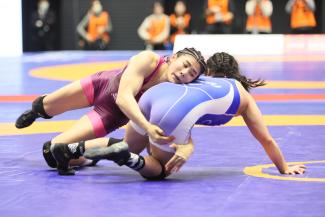
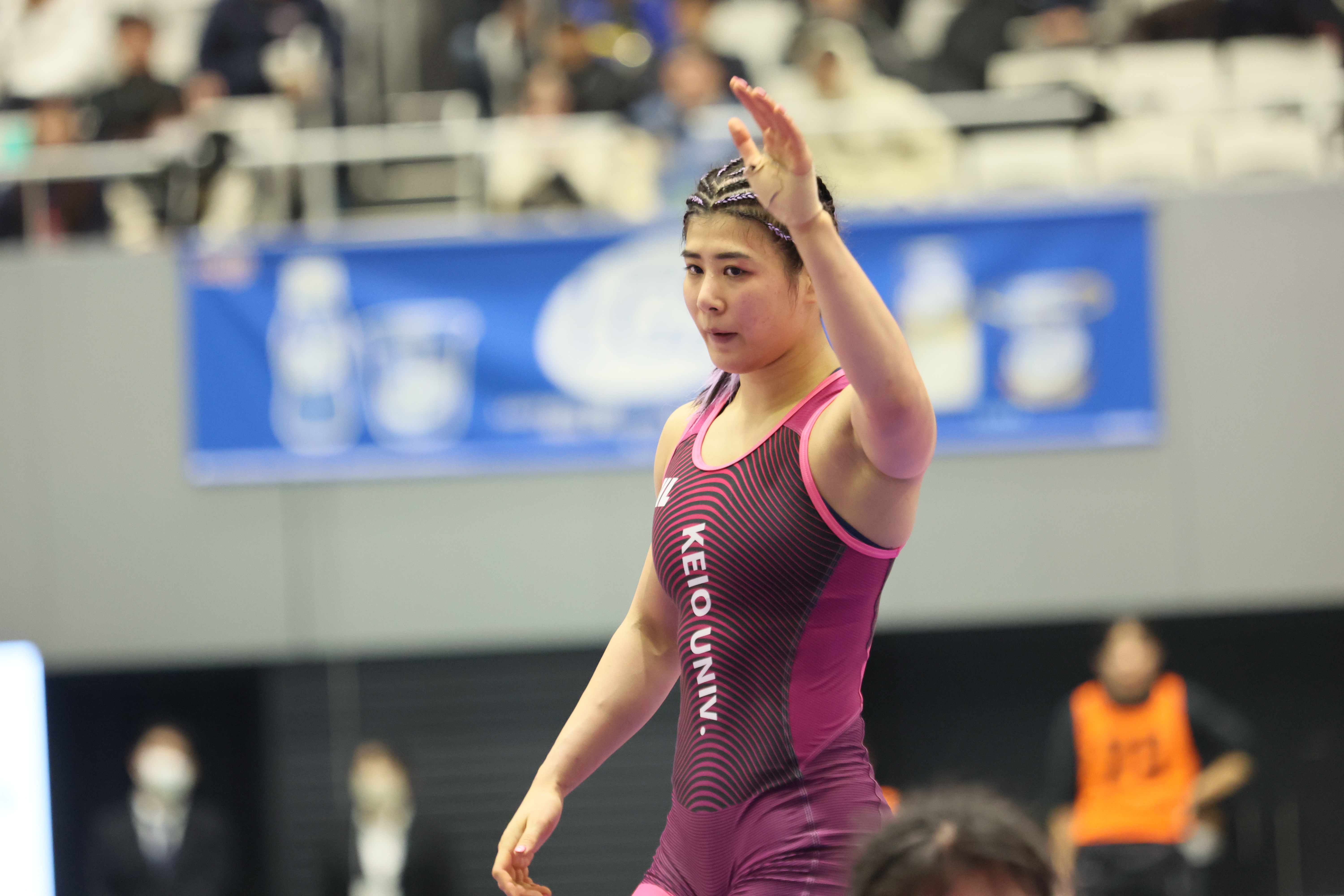 Nonoka OZAKI will wrestle Sakura MOTOKI in the 62kg final. (Photo: Takeo Yabuki / wrestling-spirits.jp)
Nonoka OZAKI will wrestle Sakura MOTOKI in the 62kg final. (Photo: Takeo Yabuki / wrestling-spirits.jp)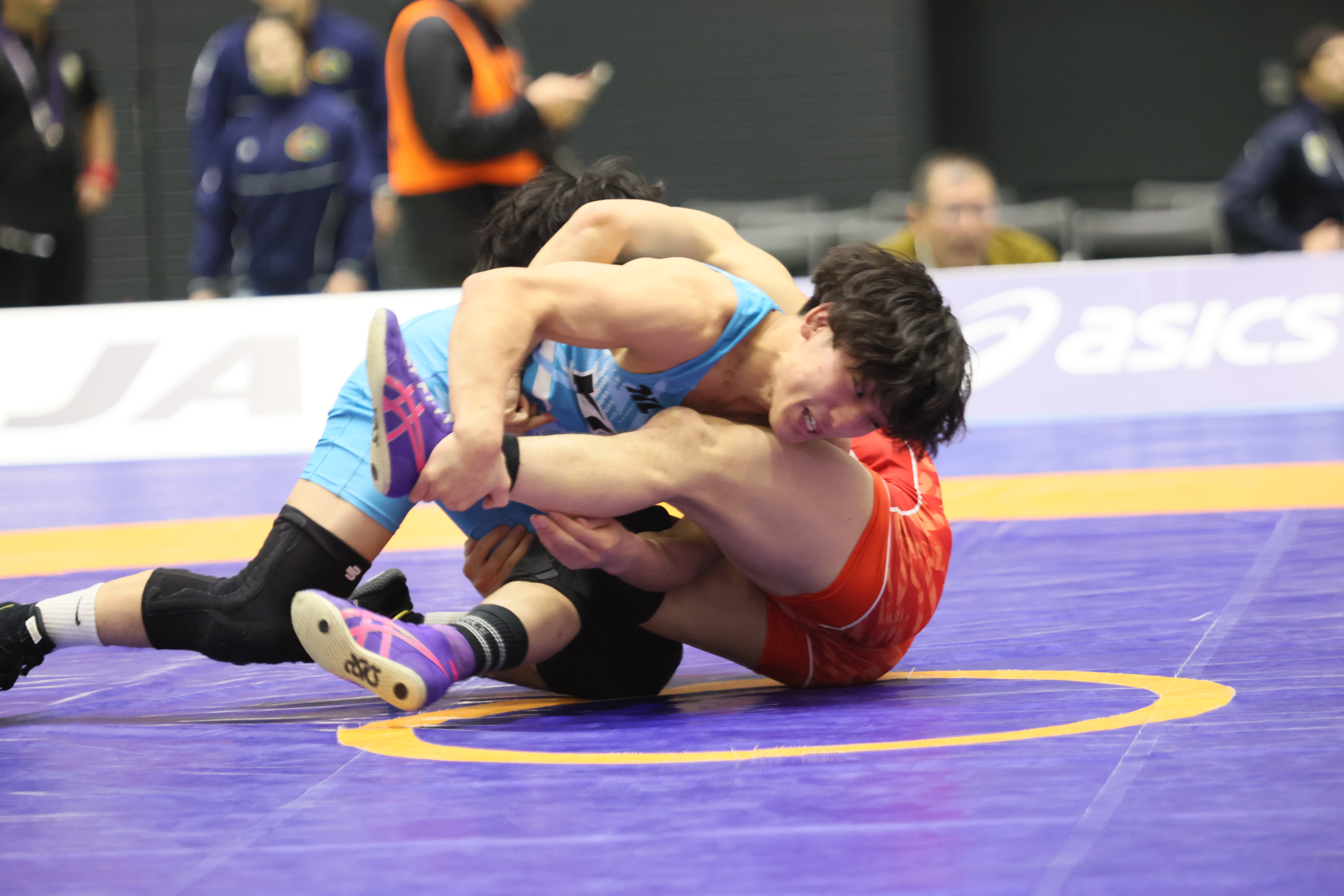 Takara SUDA, left, works for a takedown in the first period against Kaisei TANABE during their 65kg semifinal. (Photo: Takeo Yabuki / wrestling-spirits.jp)
Takara SUDA, left, works for a takedown in the first period against Kaisei TANABE during their 65kg semifinal. (Photo: Takeo Yabuki / wrestling-spirits.jp)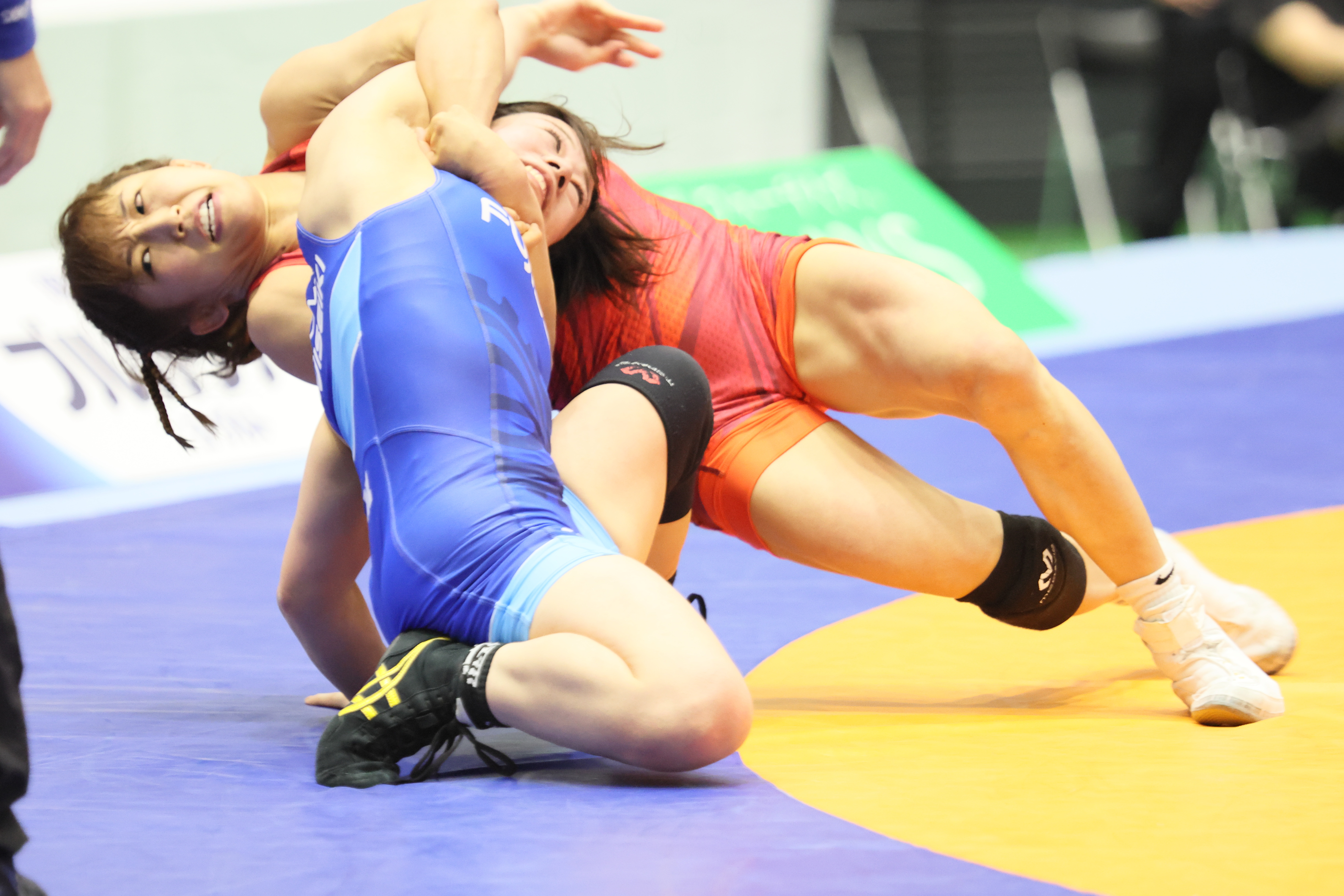 Yui SUSAKI throws Mako ONO en route to a technical fall in their 50kg semifinal. (Photo: Takeo Yabuki / wrestling-spirits.jp)
Yui SUSAKI throws Mako ONO en route to a technical fall in their 50kg semifinal. (Photo: Takeo Yabuki / wrestling-spirits.jp)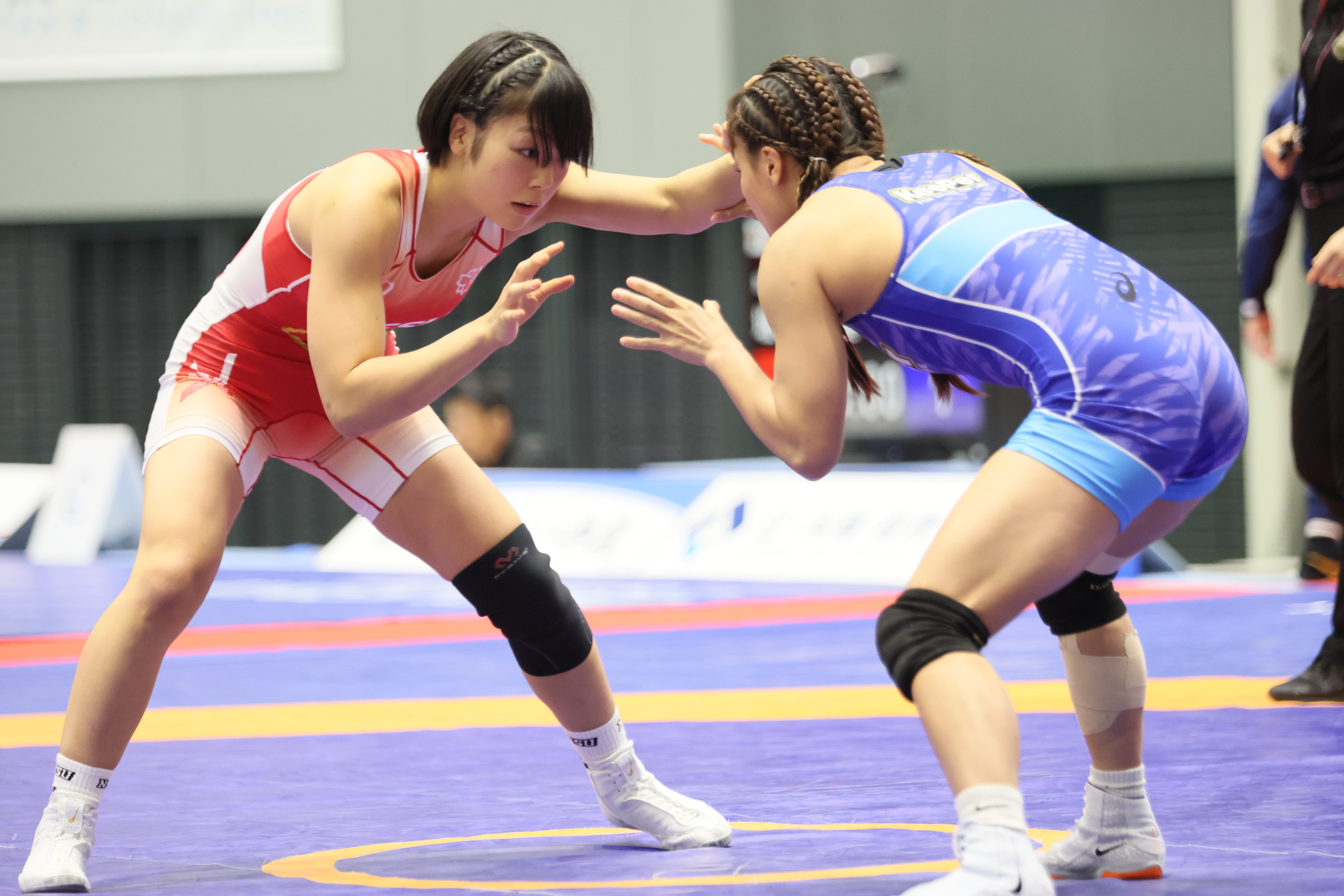 Akari FUJINAMI, left, squares off with Sara NATAMI in the 57kg semifinals. (Photo: Takeo Yabuki / wrestling-spirits.jp)
Akari FUJINAMI, left, squares off with Sara NATAMI in the 57kg semifinals. (Photo: Takeo Yabuki / wrestling-spirits.jp)
Share your thoughts.
Comments